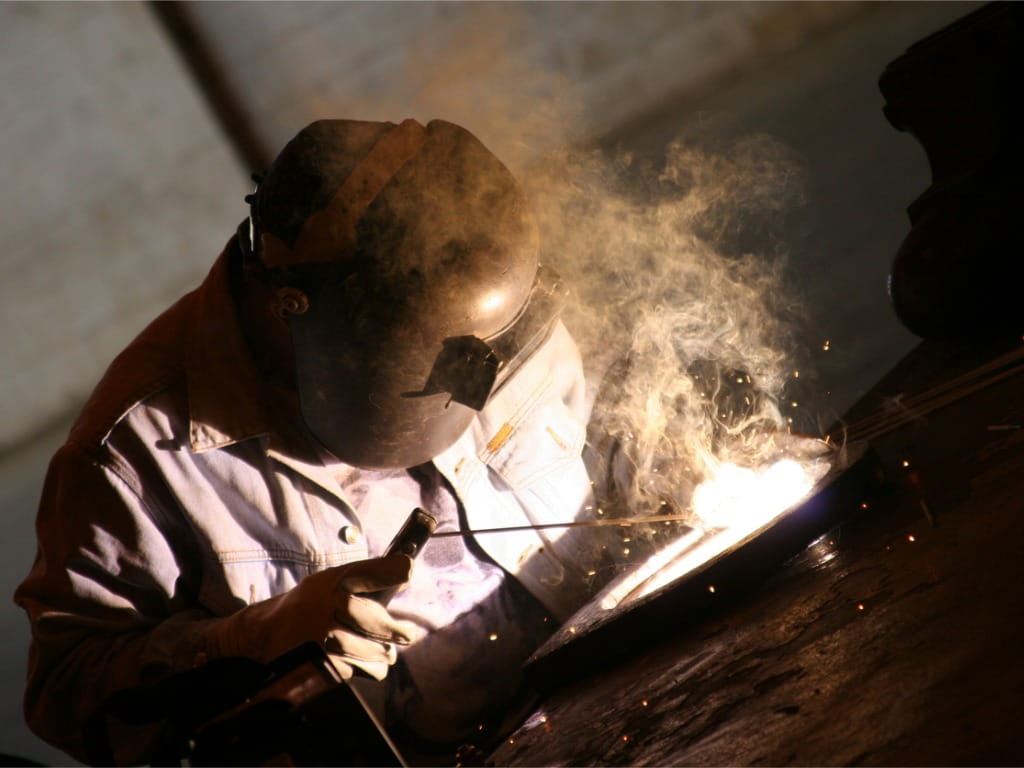Fumes from Burning Plastic, Welding, and "Teflon Flu"

The Bottom Line
Fumes from heated metal and burning plastic products can cause flu-like illnesses in people and animals. People who weld metals at work are at risk, as are those who overheat PTFE (Teflon)-coated cookware. Getting away from the source of the fumes is the most important treatment.

What is metal fume fever?
Exposure to fumes from welding metals occurs in many work settings. Some workers do not have the right protective equipment to prevent effects from exposure to the fumes created by welding in enclosed spaces without good air flow. The risk for developing metal fume fever is higher in people who work in these conditions. Zinc-coated (galvanized) and zinc-containing metals and alloys are the most common causes of metal fume fever, but the disease has been reported after exposures to a wide variety of metals including copper, iron, aluminum, and tin. Metal fume fever causes people to experience flu-like symptoms 4–10 hours after inhaling the fumes. Common symptoms include cough, difficulty breathing, fever, muscle and joint aches, and headache. Metal fume fever symptoms typically improve as the work week progresses even with continued exposure to fumes. However, when the welder returns to work after a few days off, the symptoms return and are often worse than before.
Fumes from burning plastic (polymer fume fever) and “Teflon flu”
Polymer fume fever is a similar condition caused by breathing fumes from burning plastic and polymer products. In particular, PTFE (Teflon)-coated cookware can cause these symptoms if a pan is left on a burner too long and the pan overheats or goes dry. Polymer fumes can be deadly to birds. If you have birds in your house, be very careful when using PTFE-coated cookware to ensure it does not overheat, and be sure that the kitchen is well ventilated while you are cooking. Even normal amounts of heat can produce enough toxic fumes to cause illness in birds. Unfortunately, the first sign of this illness in birds is often sudden death. Prevention is the key to keeping you and your birds healthy.
What is the treatment for metal and polymer fume fever?
The treatment of most cases of metal and polymer fume fever is simple. Getting away from the source of the fumes is the most important treatment for this condition. Adequate fluid intake, as well as use of medications like NSAIDs or acetaminophen, can be helpful in managing fever and body aches. Remaining away from the source of the exposure and taking measures to avoid future exposure are also important. People with lung conditions like asthma, or those with very severe symptoms or difficulty breathing after metal fume exposure, may require medical evaluation.
What to do if you inhale burning plastic or experience metal fume fever
If someone has developed symptoms after exposure to metal fumes or polymer fumes, get an immediate personalized recommendation online or call 1-800-222-1222. Both options are free, confidential, and available 24 hours a day.
Joshua Drobina, BSN, RN
Certified Specialist in Poison Information
Poisoned?
Call 1-800-222-1222 or
Prevention Tips
- Wear proper safety equipment when welding metals and ensure that the area is well-ventilated.
- Consult an industrial hygienist if you have concerns about exposure to metal fumes in your workplace.
- Watch nonstick pans on the stove carefully so they don’t boil dry or overheat beyond the manufacturer’s recommendations.
- If you have birds in the house, consider nonstick cookware other than PTFE-coated types.
This Really Happened
A man in his 30s came to a hospital with fever, coughing, and a sore throat. He worked as an ornamental metal welder, and he did not wear a respirator while welding. Galvanized aluminum is the main product he worked with, and he had started this job about a week earlier. Galvanized aluminum is coated with zinc, which is one of the metals that most commonly cause metal fume fever. After consulting with Poison Control, the ER physician ordered a chest X-ray to rule out other causes of his illness; it was normal. The physician recommended that the man use a respirator while performing his job to avoid this problem in the future and sent him home.For More Information
References
Poisoned?
Call 1-800-222-1222 or
Prevention Tips
- Wear proper safety equipment when welding metals and ensure that the area is well-ventilated.
- Consult an industrial hygienist if you have concerns about exposure to metal fumes in your workplace.
- Watch nonstick pans on the stove carefully so they don’t boil dry or overheat beyond the manufacturer’s recommendations.
- If you have birds in the house, consider nonstick cookware other than PTFE-coated types.
